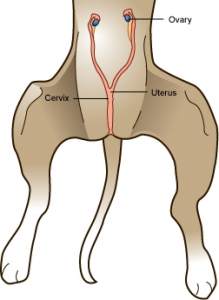Services
Desexing

Dog Spay – Female Dog Anatomy
Due to the clear health and behavioural benefits, we recommend all domestic pets are desexed. At Your Village Vet, our skilled vets perform desexing procedures on all types of pets – not just dogs and cats! Fill in the booking form to request an appointment today.
Dog Spay (Desexing)
Dog spaying is a surgical procedure called ovariohysterectomy, where the female dog’s ovaries and uterus are removed through an incision in her midline whilst under general anaesthetic. This procedure will prevent her from getting ovarian and uterine cancer, as well as a serious infection of the uterus called pyometra.
Cat Spay (Desexing)
Cat spaying is a surgical procedure called ovariohysterectomy, where the female cat’s ovaries and uterus are removed through an incision in her midline whilst under general anaesthetic. This procedure will prevent her from getting ovarian and uterine cancer, as well as a serious infection of the uterus called pyometra. Spaying your female cat:
- Helps prevent unwanted litters and limits feral cat population and its impact on the environment;
- Limits the spread of genetic abnormalities that professional breeders try to control;
- Prevents your cat developing uterine cancer and infection (pyometra);
- Significantly reduces the risk of hormone-induced diseases;
- Prevents or reduces hormone-mediated behavioural issues.
Cat Castration (Desexing)
The surgery involved the removal of his testicles whilst under general anaesthetic. This surgery will prevent testicular cancer, and behavioural problems such as urine marking. The benefits of cat castration include:
- Castration helps prevent urine spraying, which is a normal sexual behavior of uncastrated male tomcats – anyone that’s smelled tomcat urine will agree that spraying is a definitely unwanted behavior.
- Decreased aggression, due to a reduction in testosterone levels, is one of the most important behavioral advantages of castration – desexed adult cats will tend to be less aggressive toward other cats, reducing the risk of cat fight injuries and abscesses.
- Desexed cats are much less likely to react when they sense a female in heat. Male cats can sense females in heat through pheromones – attracting males from great distances.
Dog Castration (Desexing)
This involved the removal of his testicles by an incision just in front of his scrotum whilst under anaesthetic. Castration prevents testicular cancer, and behaviour problems such as aggression. The benefits of dog castration include:
- Eliminating the risk of testicular cancer – desexing removes the testes and eliminates the risk of your dog developing testicular cancer, a common and life-threatening cancer in older male dogs.
- Without desexing, your male dog’s prostate will gradually enlarge as he gets older. Prostate enlargement is uncomfortable, can make urination difficult, and can become infected without treatment. Desexing also reduces the risk of prostate cancer (but does not elimiate it completely).